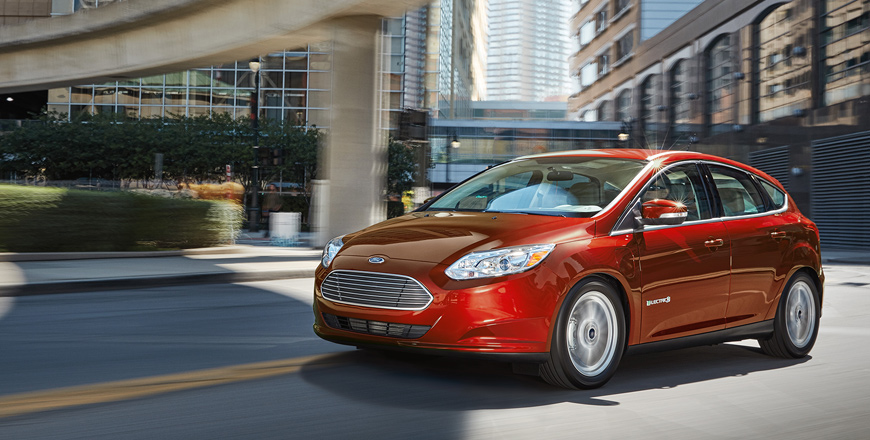One of the world’s consistently best-selling cars and among the best in its compact family car segment, the Ford Focus is a highly versatile platform. Including a broad range of models from frugal turbo-diesels and small displacement petrol versions, functional estates and high performance hot hatch versions, the Focus has however not been a particularly high selling car in Jordan. That is until recent years when the For Focus Electric has become one of several individually and unofficial popular imports taking advantage of reduced Electric Vehicle (EV) duties and taxes.
Launched in 2011 and updated and improved in 2015 with a higher capacity battery, the third generation Focus Electric is very much on its way out with production ending last year, the arrival of a new fourth generation Focus in Europe and Ford announcing its withdrawal from the US passenger car market, with the exception of the Mustang. However, with no new EV replacement, the third generation Focus Electric remains listed on Ford’s US media site and is still finding its way to Jordanian roads and independent auto traders’ lots.
Seamless delivery
Less outwardly assertive in aesthetic than other post face-lift third generation Focus models, the Focus Electric is identified by its discreet badges, smoother more aerodynamic bumper with no foglight housings and its use of pre-2015 Focus headlights that are not as sharp or strongly browed as their replacement. Also using a seemingly smaller less aggressive grille, the Focus Electric otherwise features the same urgent, jutting and confident road stance, descending roofline, rising waistline and wraparound rear lights as its combustion engine sister models and even rides on somewhat large 17-inch alloy wheels.
Also using the older and flatter pre-facelift version’s bonnet, the Focus Electric is powered by a permanent magnetic electric traction motor underneath, and driving the front wheels. With more emphasis on power than some key rivals, the Focus Electric develops a healthy 143BHP, which better balances and reconciles its comparatively high 184lb/ft torque output, as compared with other EVs with a wider disparity between the two. Responsively instant from standstill and low speeds, the Focus Electric is confidently accelerates though 0-100km/h in around 10-seconds in a seamless stretch with its single-speed auto gearbox.
Efficient electric
Accelerating in a smooth, silent and seamlessly sweeping wave of uninterrupted torque, the Focus Electric’s single speed gearbox does however contribute to its rather limited 135km/h top speed. And like most EV’s the single speed gearbox also contribute to making the Focus Electric more efficient in town where it returns the equivalent of 2l/100km fuel efficiency and 2.45l/100km on highway, as opposed to combustion engine cars. Capable of 185km/h on a single charge depending on conditions, the Focus Electric’s recharge times vary from 3.6- to 20-hours, depending on voltage and charging system used.
Less efficient and with shorter range when driven hard, and particularly on steep inclines, the Focus Electric’s high, accessibly immediate and over-arcing torque output makes responsively muscular at cruising speeds in particular for easy overtaking. Its torque bias also comes in handy in lugging its hefty batteries and consequently (and significantly) heavier mass compared with regular Focus hatchbacks. High, near instant torque also means more noticeable torque steer and momentary wheel spin before traction control systems intervene to modulate grip and slip when launching aggressively on incline.
Agile among peers
Among segment leaders in handling agility and driver involvement in combustion engine guise, the Focus Electric however many not be quite as adept, but similarly stands out among its own EV peers for its well-weighted and direct steering, tidy turn-in, good body control and relative nimbleness. But, at 1,651kg and near immediate torque surge of the driven front wheels, it understeers more readily if pushed hard, and requires one to more gently power out of corners. More flickable than some other EVs, the Focus electric’s heavy rear battery is, however, more noticeable next to regular versions.
Smooth and stable at speed with good refinement and a good mix of ride comfort and body control, the Focus Electric feels reassuring yet alert. Inside, its somewhat high seating feels similarly alert and gives good front views and support.
User-friendly inside if slightly busy in layout, the Focus Electric features decent cabin materials and rear seat space, while luggage 402-litre volume is noticeably reduced in the Electric version, but still usefully sized. Other useful standard features include rear view camera and sensors, rear child seat anchors, dual zone climate control and more.
TECHNICAL SPECIFICATIONS
Engine: Permanent magnetic electric traction, front-mounted electric motor
Battery/capacity: Liquid-cooled lithium-ion/33.5kWh
Gearbox: One-speed automatic, front-wheel-drive
Power, BHP (PS) [kW]: 143 (145) [107]
Torque, lb/ft (Nm): 184 (250)
0-100km/h: approximately 10-seconds (estimate)
Top speed: 135km/h
Range: 185km*
Fuel consumption equivalency, city/highway/combined: 2-/2.45-/2.2-litres/100km*
Charging time, min.max: 3.6-/20-hours (depending on voltage, capacity and charger type)
Length: 4,391mm
Width (mirrors folded): 1,882mm
Height: 1,478mm
Wheelbase: 2,649mm
Track, F/R: 1,536/1,513mm
Headroom, F/R: 972/965mm
Legroom, F/R: 1,094/843mm
Shoulder room, F/R: 1,412/1,336mm
Hip room, F/R: 1,369/1,341mm
Seating capacity: 5
Luggage volume: 402-litres
Kerb weight: 1,651kg
Steering: Electric-assisted rack & pinion
Suspension: MacPherson struts/multi-link
Brakes, F/R: Ventilated discs, 278mm/discs, 271mm, regenerative
Tyres: 225/50R17
*US Environmental Protection Agency figures
